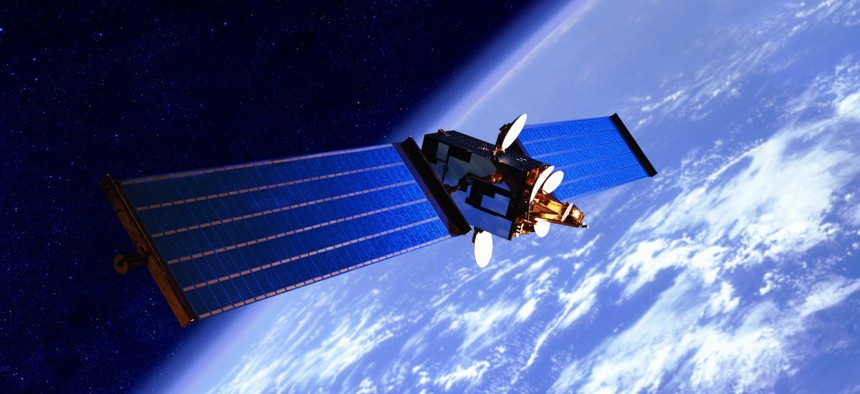House Bill a First in Decades Effort to Modernize Satellite License Rules

Michael Dunning/Getty Images
The introduced bills aim to streamline the satellite license and market access application process, while preventing entities determined to be a national security threat from receiving a license.
House Energy and Commerce Committee leaders introduced two bills—the Satellite and Telecommunications Streamlining Act and the Secure Space Act—to legislatively modernize the Federal Communication Commission’s satellite licensing rules for the first time in decades.
The bipartisan legislation clarifies the FCC’s authority under the Communications Act of 1934, encourages responsible space management, protects national security, promotes investment and innovation and furthers American leadership in next-generation satellite communications.
“America is leading the way in next-generation satellite technologies, which are contributing to a revolution in the communications marketplace,” Chairman Frank Pallone, Jr., D-N.J., and Ranking Member Cathy McMorris Rodgers, R-Wash., said. “To make sure the U.S.—not China—continues to lead this global industry, we must streamline our regulatory processes to unleash innovation while also ensuring our laws fully protect the American public. We continue to encourage all interested parties to engage with us as we work to usher in a new era of investment and innovation in this critical sector.”
The Satellite and Telecommunications Streamlining Act, introduced by McMorris Rodgers, will amend the Communications Act of 1934 by adding a new section to streamline FCC satellite and satellite constellation approvals by setting time limits on application decisions. It also streamlines the application renewal process. In certain situations, companies could ask for expedited treatment. The FCC will fast-track licenses under “specific, measurable and technology-neutral performance objectives for space safety and orbital debris.”
The act provides requirements for each license, such as for the FCC to create objectives for space safety and orbital debris—an issue of increasing interest in the government, as the FCC recently decreased the time limit to deorbit satellites no longer in use.
The bill also includes application, decision and implementation requirements for both licenses and market access.
“American companies are leading the way in the space economy revolution, and Congress has recognized that we must act quickly to secure America’s role as the home to the most innovative new companies in the emerging launch and satellite sectors,” FCC Commissioner Nathan Simington said. “We must therefore ensure that we do not delay U.S. leadership by allowing providers of these invaluable services to get bogged down in the regulatory process. This legislation gives government the keys to ensuring that we continue to lead the world in robust connectivity and in the deployment of new technologies.”
The Secure Space Act, introduced by Pallone, will amend the Secure and Trusted Communications Networks Act of 2019 to prevent the FCC from giving a license or U.S. market access for a non-geostationary orbit satellite system to entities and their affiliates that are national security threats. The FCC’s covered entities list identifies those that, according to the 2019 act, present “an unacceptable risk to the national security of the United States or the security and safety of United States persons.” While the legislation does not name specific entities, these would include Huawei, ZTE and others that have been deemed a national security threat under telecommunications regulations. The new legislation would now extend this ban to space satellites.






